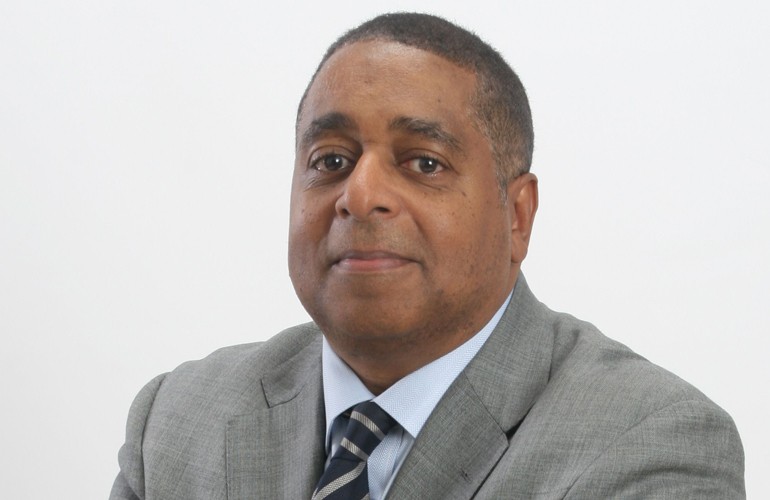 Subscribe
Subscribe- Login
-
/
Sign Up
- US Black Engineer
- >>
- News
- >>
- BDPA honors Intel’s Melvin Greer
|
Getting your Trinity Audio player ready...
|
Melvin Greer is the inventor of Thundercloud, an app used for providing a faster route to the cloud to first responders for incident respondents. Mr. Greer’s research in agile software, cloud computing and business analytic resulted in new global standards, tools, and technical methods.
This July, he will receive a Lifetime Achievement Award during BDPA’s 39th Annual Technology Conference and Career Fair at the Duke Energy Convention Center in Cincinnati, Ohio. BDPA is the largest African-American information technology association in the U.S., and the largest non-profit organization continually involved in training students underrepresented in science, technology, engineering and math (STEM).
The BDPA citation reads:
“In addition to his professional and investment roles, Melvin is responsible for building Intel’s data science platform through artificial intelligence, machine learning, and cognitive computing. His systems and software engineering expertise have resulted in patented inventions in Cloud Computing and Synthetic Biology. Greer functions as a principal investigator in advanced research studies and is a member of the American Association for the Advancement of Science (AAAS) and U.S. National Academy of Science, Engineering, and Medicine.”
USBE Online caught up with Mr. Greer recently. Below are excerpts from the interview.
USBE: When we last spoke, you had just been nominated for a 2012 Black Engineer of the Year Award (BEYA), in recognition of your outstanding contribution in industry and to products that have a broad impact and high value. You were a senior fellow and chief strategist for Cloud computing in Lockheed Martin’s information systems and global solutions business unit.
Melvin Greer: I was recruited from Lockheed Martin to help Intel Corporation pivot to a data company.
USBE: What do you do as a senior principal engineer and director of data science and analytics at Intel, which is changing from a technology company to a Data Company?
MG: It’s a position I’ve held for two years. The responsibilities of my current job are:
– Build Intel’s data science platform through artificial intelligence, machine learning, and cognitive computing to accelerate the transformation of data into a strategic asset for public sector and commercial enterprises.
– Build a diverse workforce and talent pipeline of underserved communities.
– Serve as a role model and mentor for future leaders and up and coming technical talent.
USBE: What are you currently working on?
MG: I’m a principal investigator on how to advance the body of knowledge in basic research as well as critical, highly advanced engineering and scientific disciplines.
USBE: What kind of education and training you have?
MG: I received a Bachelor of Science in Computer Information Systems and Technology, and a Master of Science in Information Systems from American University in Washington D.C. I also completed the Executive Leadership Program at the Samuel Curtis Johnson Graduate School of Management at Cornell University, and the Entrepreneurial Finance Post Graduate Program at the business school of the Massachusetts Institute of Technology.
USBE: Why did you decide to enter this field?
MG: I’ve always had a curiosity about science and how things work. Now, I have a strong desire to influence the advancement of science and research.
USBE: As an influencer, how would you describe your leadership style?
MG: Ambidextrous, with a focus on operational excellence and advanced innovation.
USBE: What’s next?
MG: I’m writing two new books on artificial intelligence (AI) and Internet of Things (IoT) security, my sixth and seventh books.
USBE: You also speak French, Italian, and Portuguese. What are some of your other personal achievements?
MG: Married 18 years with a wonderful wife and two incredible boys.
USBE: Who was your inspiration growing up and why?
MG: My mother, Eleanor Dee Greer. She was a teacher or principal in every school I attended until college. I’ve found an academic scholarship in her name and awarded 4 students over the last two years.
USBE: Your parents also raised four children to be successful engineers. What else do you do to give back?
MG: I created The Greer Institute for Leadership and Innovation. Its primary mission is to lead and develop advanced research, which shapes a more diverse generation of up-and-coming technical talent.
USBE: What’s your best advice for students?
MG: Get a mentor, develop a personal brand, develop a career, plan, and be flexible.
USBE: Fun facts about yourself?
MG: I enjoy scuba diving, tennis, and running. My wife and I spent a month scuba diving in the South Pacific—Australia, Palau and Papua New Guinea and the Solomon Islands. My wife is a chef, so clean, authentic food is important to me.
‘Favorite things’
Books: “A Delicate Balance: The South Pacific” by Maria Di Paolo-Greer and “Weapons of Math Destruction” by Cathy O’Neil
Apps: Waze, Science, and Yelp
Websites: Business Insider, Washington Post
USBE: Which professional organizations do you belong to?
MG: I’m a member of the American Association for the Advancement of Science (AAAS) and U.S. National Academy of Science, Engineering, and Medicine, Government-University-Industry Research Roundtable (GUIRR). Member of the International Monetary Fund (IMF)/ World Bank, Bretton Woods Committee, where I explore how the deployment of enabling technologies relates to private sector development, commercial opportunities, global financial stability and social responsibility. I also serve on the Board of Trustees for Capitol Technology University in Laurel, Maryland and on the Board of Directors for the Northern Virginia Children’s Science Center. I’m a Fellow at the National Cyber security Institute, Washington, D.C.
USBE: Biggest challenge?
MG: Work-Life balance
USBE: Hometown?
MG: Detroit, Michigan

